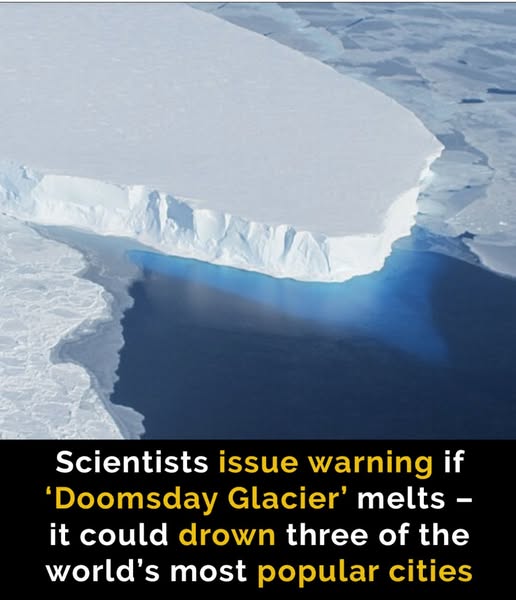
Three of the world’s most famous cities could face devastating flooding if Antarctica’s massive Thwaites Glacier — often called the “Doomsday Glacier” — collapses. New research suggests this scenario may be more likely than previously believed.
For years, scientists have linked climate change to rising sea levels, warmer global temperatures, and more extreme weather patterns. But the Thwaites Glacier, located in West Antarctica, is drawing special concern because of its sheer size and potential impact.
Thwaites holds enough ice to raise global sea levels by more than two feet. If it were to collapse completely, experts say it could destabilize the surrounding Antarctic ice sheet, triggering a dramatic sea-level rise of up to 10 feet. Such an increase would put major cities like London, New York, and Bangkok at risk of severe flooding, threatening millions of residents and key global economies.
Since 2018, the International Thwaites Glacier Collaboration (ITGC) has been monitoring the glacier’s stability. Their latest findings are troubling. Researchers discovered vast “hidden lakes” beneath the glacier, which appear to be accelerating ice loss at a much faster rate than expected.
In March 2025, a study led by Professor Noel Gourmelen confirmed that water draining from these subglacial lakes is directly contributing to Thwaites’ instability. “We expected that water draining from the underside of the ice sheet plays a role in modulating ocean melting,” Gourmelen explained. “The magnitude of this drainage gave us the chance to finally observe and measure its true impact.”
This sudden outflow acted as a temporary “turbo charge” to the glacier’s retreat, occurring during a season when the Southern Hemisphere was already experiencing unusually high temperatures.
Dr. Alastair Graham, a marine geologist at the University of South Florida and ITGC member, told News.com.au: “If Thwaites Glacier collapses, it could cause a sea-level rise of around 65cm (25 inches). This year’s conditions are very unusual, and the system may not recover quickly. The dynamics are changing.”
Although experts caution that a complete collapse of the glacier may still be decades or centuries away, the new findings suggest the timeline could be shorter than once believed. If that tipping point is reached, coastlines, infrastructure, and communities worldwide would face long-term consequences.
For now, scientists continue to monitor Thwaites closely, stressing the importance of global cooperation in addressing climate change. Their work highlights the urgent need for action — not just to better understand glaciers like Thwaites, but to prepare cities and communities for the challenges ahead.
What do you think — can humanity act in time to slow the glacier’s retreat, or are we already too late? Share your thoughts below!



